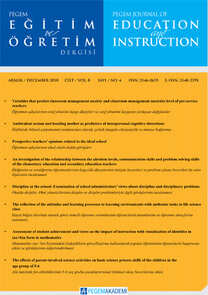Öğretmen Adaylarının Hidroelektrik Santralleri Konusundaki Bilissel Anlayısları
Bu çalısmada amaç, son zamanlarda Türkiye’de medyanın gündemini mesgul eden hidroelektrik santraller ve bu santrallerin ürettiği enerji kullanımı konusunda öğretmenadaylarının sahip oldukları bilissel anlayısları belirlemektir. Arastırmada durum tespitine yönelik, nicel arastırma paradigmasına dayanan betimsel (tarama) yöntem kullanılmıstır.5’i doğru; 10’u ise bilimsel açıdan yanlıs olarak kabul edilen ifadelerden ibaret besli likert tipi bir ölçme aracı gelistirilmistir. Hazırlanan ölçme aracının güvenilirliği (Cronbach α) .82 olarak bulunmustur. Ölçme aracı, Recep Tayyip Erdoğan Üniversitesi Eğitim Fakültesi’ninSınıf Öğretmenliği, Sosyal Bilgiler Öğretmenliği ve Fen Bilgisi Öğretmenliği programlarına devam eden toplam 422 öğretmen adayına uygulanmıstır. Verilerin analizi için t-testi, tek yönlü varyans analizi ve varyans analizinde farkın yönünü belirlemek için ise, Post Hoc testlerinden Sheffe testi kullanılmıstır. Çalısma sonucunda, öğretmen adaylarının hidroelektrik santraller konusundaki bilgi edinme kaynakları ile bilisselanlayısları arasında anlamlı iliski bulunmustur. Öğretmen adaylarının öğrenim gördükleri alan ve cinsiyetlerine göre hidroelektrik santralleri konusundaki bilissel anlayısları arasında anlamlı farkın olduğu belirlenmistir. Bunun yanında arastırmada geleceğin öğretmenleri olarak düsünülen öğretmen adaylarının hidroelektrik santralleri konusunda yeterli düzeyde bilissel anlayıslara sahip olmadığı ortaya konulmustur.
Anahtar Kelimeler:
Öğretmen Adayları, Hidroelektrik Santralleri, Bilişsel Anlayış
The Cognitive Understandings of Student Teachers About Hydroelectric Plants
The purpose in this study is to determine cognitive understandings of student teachers about the use of energy produced by these plants and hydro-electric plants, which have recently engaged in the agenda of the media in Turkey. The descriptive (scanning) method which based on quantitative research paradigm intented for the case study in study is used. The five Likert-type instrument consist of fifteen statements (5 right, 10 scientifically incorrect) have been developed. For the measurement instrument reliability coefficient (Cronbach α) was found to be .82. Measurement tool, Recep Tayyip Erdogan University, Faculty of Education, Classroom Teacher, Social Studies and Science Teacher Education programs, a total of 422 student teachers, was applicated. For analysis of the data, t-test and one-way variance analysis was used and for determine the direction of the difference in variance analysis, the Scheffe test was used. As a result, it was found significantly correlation between teacher candidates’ the sources to obtain information about hydroelectric plants and the cognitive understandings. According to the gender and their fields of the teacher candidates, cognitive understandings about hydroelectric plants showed significant difference. In addition, cognitive understandings of student teachers is considered as teachers of future about hydroelectric plants does not have a sufficient level.
Keywords:
Student Teachers, Hydroelectric Plants, Cognitive Understanding,
- ISSN: 2146-0655
- Başlangıç: 2011
- Yayıncı: Pegem Akademi Yayıncılık Eğitim Danışmanlık Hizmetleri Tic. Ltd. Şti.
Sayıdaki Diğer Makaleler
ÖYP Arastırma Görevlilerinin Yurt İçi ve Yurt Dısı Dil Eğitimlerine İliskin Görüsleri
Ceylan GÜNDEĞER, Sümeyra SOYSAL, Esed YAĞCI
Ahmet IŞIK, Alper ÇİLTAŞ, Tuğrul KAR
Mehmet Nuri GÖMLEKSİZ, Ayşe Ülkü KAN, Ümmühan ÖNER
Öğretmen Adaylarının Hidroelektrik Santralleri Konusundaki Bilissel Anlayısları
Her Alanda Yeni Steve Jobs’lar Yaratmak için Girisimci Öğretim ve Girisimci Öğretim Üyeliği
Lise Öğrencilerinde Okul Kültürünün Bir Öğesi Olarak Okul Yasam Kalitesi Algısının İncelenmesi
